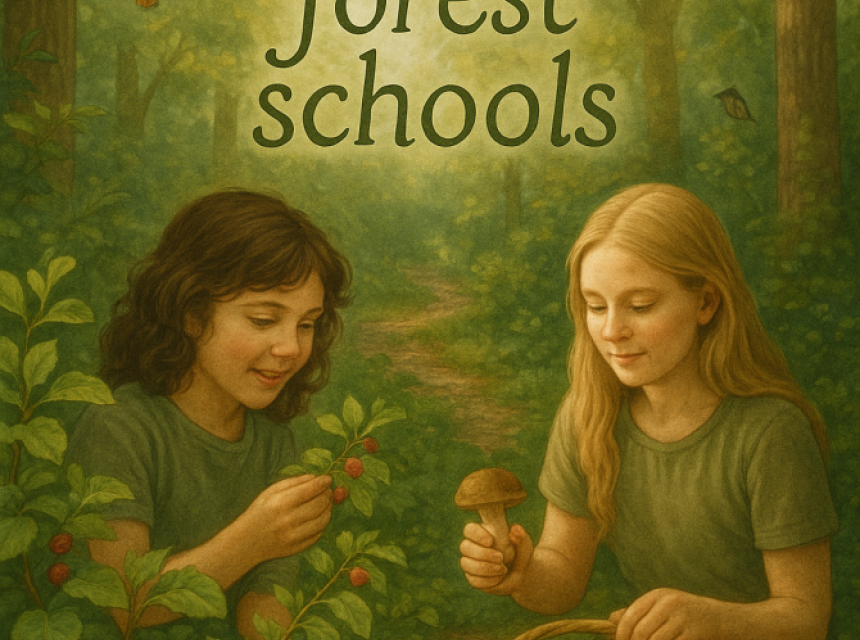In an age of accelerated change and digital saturation, forest schools offer a sanctuary—one where children reconnect not only with nature, but with themselves and each other. These nature-based learning environments reflect a growing movement toward soul-centered education, deeply aligned with the Schetinin pedagogy of Russia’s Tekos School and the foundational ethics of Permaculture: Earth Care, People Care, and Fair Share.
At the heart of both forest schools and the Schetinin model is trust in the child's innate intelligence and capacity for self-directed growth. Children are not vessels to be filled with fragmented facts; they are whole beings capable of profound insight, especially when given space, responsibility, and a nurturing environment. Forest schools reject rigid, fragmented instruction in favor of experiential, interconnected learning. Lessons are not confined to textbooks or whiteboards but are drawn from the living landscape—where each moment in the forest becomes a doorway into science, storytelling, mathematics, ethics, and more.
In forest schools, learning unfolds through direct interaction with the natural world. Trees become teachers of patience and resilience. Streams invite inquiry into flow and physics. Animal tracks ignite curiosity about biology and storytelling. This mirrors Schetinin’s principle that all subjects are interconnected, and that real learning happens through purpose and context, not rote memorization.
Key benefits include:
- Deepened emotional and social intelligence: Working in mixed-age groups, as is common in forest and Schetinin-style environments, children learn to lead, support, and collaborate—skills essential for thriving communities.
- Increased creativity and problem-solving: Nature offers open-ended materials and challenges that invite innovation, mirroring the Schetinin view that learning is a co-creative process between the learner and the world.
- Greater confidence and self-regulation: With freedom to take healthy risks and engage their senses, children develop self-trust and calm presence—qualities often dulled in more restrictive settings.
- Embodied understanding of ecology and stewardship: When children know the forest as a friend and teacher, they grow into adults who protect and care for Earth with reverence.
Perhaps most beautifully, both approaches acknowledge that education is not just about gaining knowledge—it’s about awakening wisdom. In forest schools guided by Schetinin-inspired values, learning becomes a soulful journey—alive, integrated, and in harmony with the living world.
Earth Care
Children in forest schools develop a reverent relationship with the land. They don’t just study ecosystems—they live within them. Whether tending to a garden, building with fallen branches, or observing seasonal patterns, they cultivate a sense of stewardship and responsibility. This mirrors both Permaculture’s ethic of Earth Care and Schetinin’s principle that “learning without love for the world is not true learning.”
People Care
Learning in community is central. Like Schetinin’s multi-age learning circles, forest schools emphasize collaboration over competition, empathy over achievement. Children take care of one another, share knowledge across ages, and discover that their voice matters. This echoes Permaculture’s People Care ethic, cultivating future leaders who understand that thriving communities are built on mutual respect and shared contribution.
Fair Share / Future Care
Forest schools prepare children not just for the world as it is, but for the world they are called to co-create. Children are invited to consider how their actions ripple outward. Sharing resources, co-managing tasks, and reflecting on collective needs brings Permaculture’s ethic of Fair Share to life. In this way, education becomes an act of regeneration—of Earth, of society, and of the human spirit.
A Living Education for a Living World
Forest schools—especially those informed by Schetinin’s philosophy—are not an “alternative.” They are a return to what is natural, timeless, and true. By weaving together Earth wisdom, child-led learning, and ethical design, they remind us that education is not just the transfer of information. It is the awakening of wisdom, the tending of soil and soul, and the planting of seeds for a more harmonious future.
To learn more about forest schools go to https://bbsradio.com/alllearningreimagined podcast recording to listen to inspiring guest speaker Rakel Dominguez for 27th June.
Enjoy! Teresa 2025
For more information contact:
IKI-GAIA Ecovillage Model, Axarquia (Málaga) – Semilla Monte Alegre








